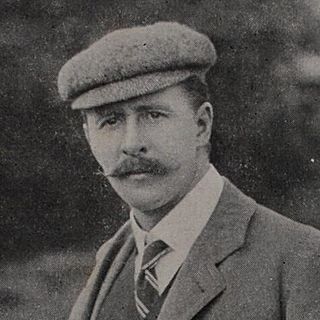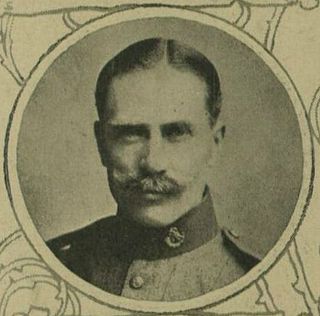
The City of Chester is a constituency represented in the House of Commons of the UK Parliament since 2 December 2022 by Samantha Dixon of the Labour Party. She was elected in the by-election held following the resignation of Chris Matheson MP on 21 October 2022.
Edinburgh and St Andrews Universities was a university constituency represented in the House of Commons of the Parliament of the United Kingdom from 1868 until 1918. It was merged with the Glasgow and Aberdeen Universities constituency to form the Combined Scottish Universities constituency.
The 1943 Darwen by-election was a by-election held on 15 December 1943 for the British House of Commons constituency of Darwen in Lancashire.

Sir Arthur Alexander Priestley was an English Liberal Party politician and cricketer. After three unsuccessful candidacies he held a seat in the House of Commons from 1900 to 1918. At cricket, he played for Marylebone Cricket Club (MCC) and took part in and later led overseas touring sides between 1894 and 1897.
The 1939 Westminster Abbey by-election was a parliamentary by-election held on 17 May 1939 for the British House of Commons constituency of Westminster Abbey in London.

Sir William Younger, 1st Baronet was a Scottish politician who served as a member of parliament (MP) for a total of 11 years between 1895 and 1910.
The 1919 St Albans by-election was a parliamentary by-election held in England in December 1919 for the House of Commons constituency of St Albans in Hertfordshire.
The Rochester by-election was a Parliamentary by-election held on 23 September 1903. The constituency returned one Member of Parliament (MP) to the House of Commons of the United Kingdom, elected by the first past the post voting system.
The Edinburgh East by-election was a Parliamentary by-election held on 2 February 1912. The constituency returned one Member of Parliament (MP) to the House of Commons of the United Kingdom, elected by the first past the post voting system.
The 1898 Liverpool Kirkdale by-election was a parliamentary by-election held in England on 9 December 1898 for the House of Commons constituency of Liverpool Kirkdale.

The 1897 Walthamstow by-election was a parliamentary by-election held in England on 3 February 1897 for the House of Commons constituency of Walthamstow. The area was then a division of Essex, and is now part of Greater London.
The 1922 Liverpool Exchange by-election was a by-election held in England for the House of Commons constituency of Liverpool Exchange on 13 March 1922.
The 1916 Liverpool East Toxteth by-election was a parliamentary by-election held in England on 21 February 1916 for the House of Commons constituency of Liverpool East Toxteth.
The 1892 Liverpool Everton by-election was a parliamentary by-election held in England on 15 February 1892 for the House of Commons constituency of Liverpool Everton.
The North West Staffordshire by-election was a Parliamentary by-election held on 31 July 1907. The constituency returned one Member of Parliament (MP) to the House of Commons of the United Kingdom, elected by the first past the post voting system.

The Mile End by-election was a Parliamentary by-election held on 12 January 1905. The constituency returned one Member of Parliament (MP) to the House of Commons of the United Kingdom, elected by the first past the post voting system.
The Elgin Burghs by-election was a Parliamentary by-election held on 8 September 1905. The constituency returned one Member of Parliament (MP) to the House of Commons of the United Kingdom, elected by the first past the post voting system.
The Carlisle by-election was a Parliamentary by-election held on 14 July 1905. The constituency returned one Member of Parliament (MP) to the House of Commons of the United Kingdom, elected by the first past the post voting system.
The Appleby by-election was a Parliamentary by-election held on 2 March 1905. The constituency returned one Member of Parliament (MP) to the House of Commons of the United Kingdom, elected by the first past the post voting system.
The 1902 Devonport by-election was held on 22 October 1902 after the death of one of the incumbents, Liberal politician E. J. C. Morton. The contest was won by the Conservative Party candidate John Lockie.





